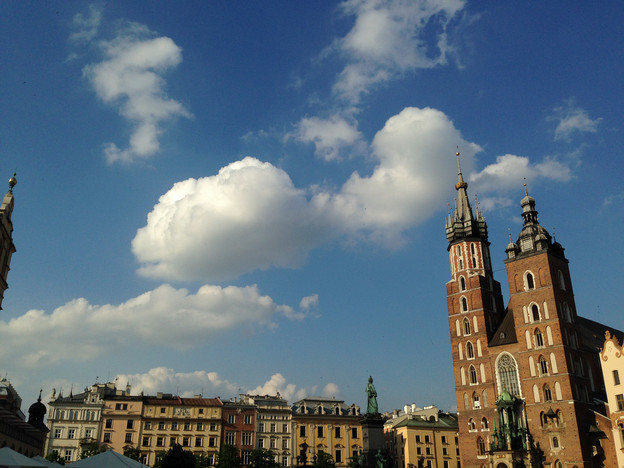Strange weathers: Piotr Florczyk in Kraków

On a December visit from Los Angeles to his native city of Kraków, writer and translator Piotr Florczyk longs for the snow of his childhood, and I think of how weather translates from physical to emotional, personal to communal, into landscapes current and remembered.
They say there is no weather in Los Angeles, but for one who's lived here always, it's a different story. Only in deep winter, do all the camellias open to a riot of pink, the backyard orange tree alight with small suns.
The first time I saw snow in the real world, I was in a home other than my own, an Amsterdam pensione in the century before Airbnb. Imagine pre-Internet train travel and telephone booths, two students wandering an unknown city with nothing but backpacks, knocking on doors of addresses listed in a printed guidebook and hoping for the best.
I had seen snow in pictures of course, on television, and while floating inside the tunnel of an amusement park ride. But only when I traveled outside the borders of my own country did I see, finally, a winter phenomenon so common for so many in the world, it appears as normal—snowflakes falling from the sky.
Such a surprise of quietness, just the other side of a small-paned window one morning upon awakening after a traveler's exhausted sleep. Large, slow-moving flakes, as if scissor-cut from paper, as if in a fairy tale.
I rubbed my eyes and stumbled out of bed to find a breakfast table laid with all manner of delights— imagine, cheese at breakfast!
Thirty years later, the fairy tale has darkened to reveal atmospheric anomalies brought on by human failings, avaricious shortsightedness, this week's reports of the Earth's hottest year on record. A new phrase enters the lexicon: climate change refugee.
And then there are the discordant weather patterns caused by the wrenching displacement of war. Towards the end of November, the BBC reported the sheltering of 392 refugees in a Wild West theme park located deep in a Swedish forest. Unlike the unexpected sunshine of Krakow, the High Chaparral grounds were already frosted with bitter cold.
How might someone who's fled her ravaged home name the strangeness of snow?
Flurry or blizzard? Avalanche, drift, icicle—how might its coldness catch on her tongue?
In "The paradigm of translation," Paul Ricœur addresses the notion of estrangement in relation to human and linguistic multiplicity: "There is something foreign in every other. It is as several people that we define, that we reformulate, that we explain, that we try to say the same thing in another way."
As a lineated poem is sometimes called verse, plow that turns at the edge of a field. Or maybe the field, uprooted; the poem, compass in a hailstorm.
•
In Praise of Snow
by Piotr Florczyk
For over twenty years, I’ve made my home in the U.S., mostly in Los Angeles and elsewhere in Southern California, but this past December I returned to my first one, Kraków. The unseasonably warm weather—as high as mid-50s—was a welcome relief to the locals. Instead of hiding indoors, they strolled around the picturesque Stare Miasto, feigning sadness at the thought of another Christmas without snow. In fact, depending on whom you talked to, words of blame or gratitude for the change in weather were aimed at the ascended old-new ruling party, the Russians, the Germans, the European Union, or this thing called ‘global warming.’ I wanted to write about the spectacle in real time, while I was there, but I too found the weather more conducive to other activities. Awaiting God’s arrival, I went swimming and running with friends. Nearly every morning, my parents and I shopped for fresh bread, mandarins, ham, and sausage. The only snow I saw was on TV, during commercials promising unforgettable ski vacations in Austria and Italy. No bueno: I came to Kraków to escape the sunshine rather than have more of it.
In the evenings, returning after a day of business and pleasure to my parents’ apartment atop a hill on the outskirts of town, I longed for snow and watched the lights in the windows of adjacent buildings flicker like Christmas tree lights. Meanwhile, down below, the commuters hurried home unhampered. Fearing I was missing out on something, I insisted on taking another walk—somewhere, anywhere—in hope of making the strange feel familiar again. I was born and raised in this city, after all. I knew the shortcuts. How to approach someone on the street and say "I’m lost" in our shared language. Louis MacNeice thought of the world as crazy and “suddener than we fancy it.” I wanted to tame its multitude inside me. Damn it! A little bit of snow would’ve made things easier. Think footprints. Remember the snowman. The white of snow is a beauty—and, more important, in the words of Tadeusz Różewicz (trans. by Joanna Trzeciak), it is "neither sad / nor glad / it’s just white."
•
Piotr Florczyk is the author of East & West: Poems (Lost Horse Press), a collection of essays Los Angeles Sketchbook (Spuyten Duyvil), a chapbook Barefoot (Eyewear Publishing), and several volumes of Polish poetry translations, including Anna Świrszczyńska’s Building the Barricade, with an introduction by Eavan Boland (Tavern Books, 2016). He studies in the Ph.D. in Literature and Creative Writing Program at the University of Southern California. Please visit his website: www.piotrflorczyk.com
•
Paul Ricoeur, "The paradigm of translation," On Translation, trans. Eileen Brennan, introduction by Richard Kearney (London: Routledge, 2006), 25.
A poetics of the étrangère